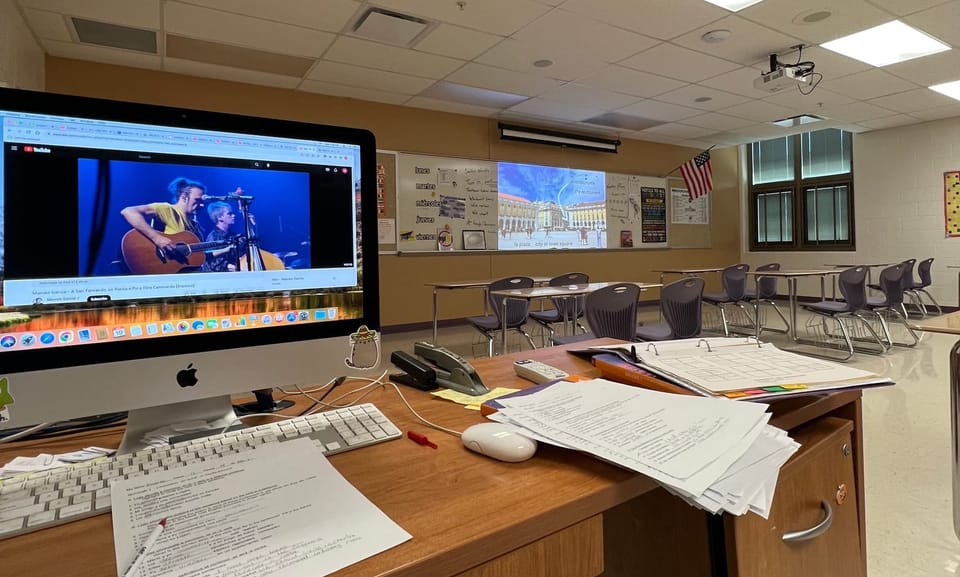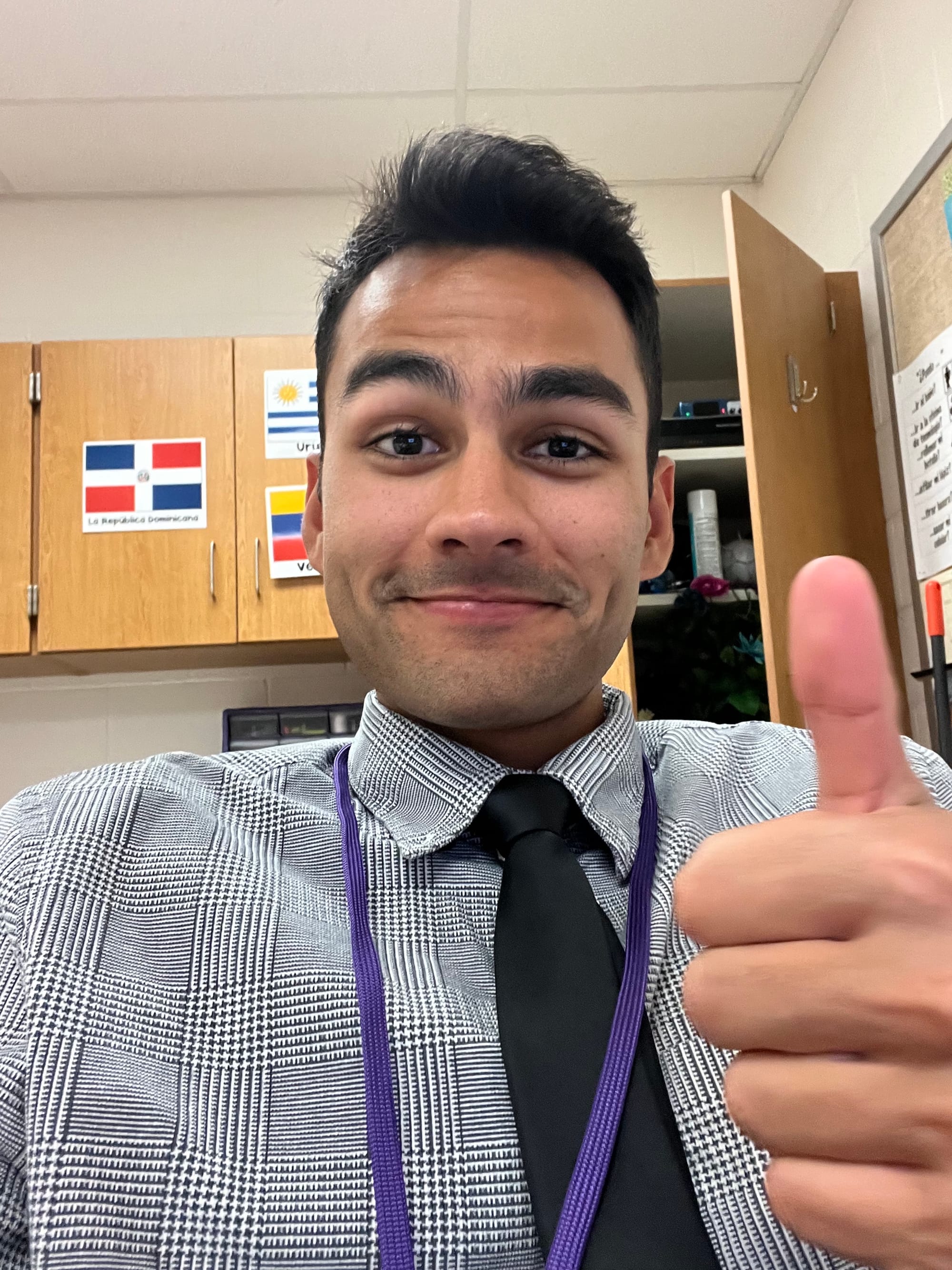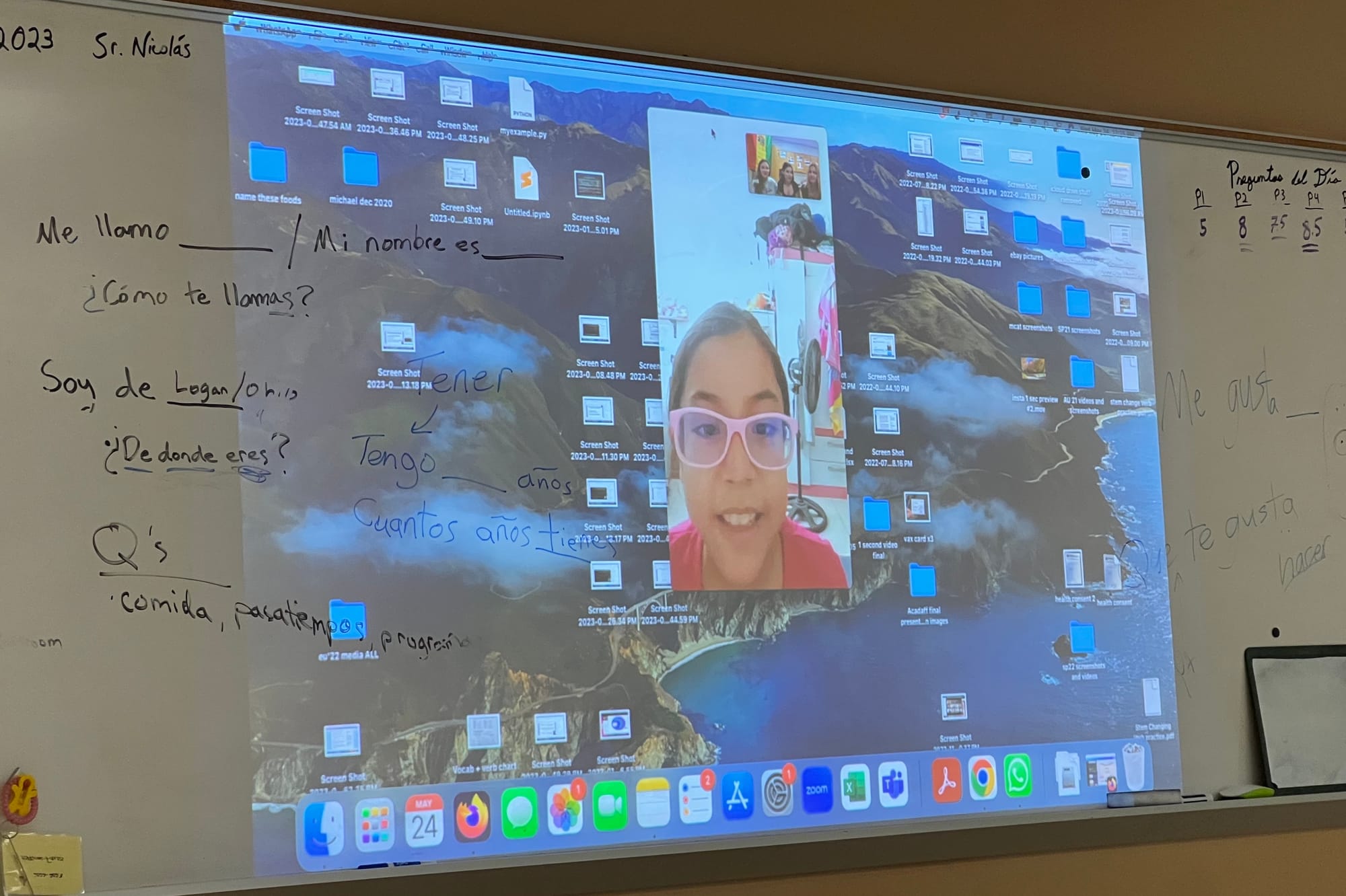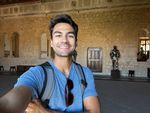Señor Nicolás

After spending a week as a camp counselor at our Ohio University Heritage College of Osteopathic Medicine Medical Academy for high school students, I was reminded of an essay I never published and the sentiments it expresses.
written June 2023
For a large portion of April and May, I was not just Nicholas, Coach Nicholas, or Mr. Kudlapur. I was Señor Nicolás. And it was amazing.
I moved back to Ohio from Florida on Easter weekend. My time down south had been great, but I was excited to be back in town, working with the home community I felt close to. On Monday, I picked up an intervention specialist substitute position at my local high school. When I arrived, I was pleasantly surprised to see that I had been reassigned to one of the math teachers. Intervention specialists do awesome work, but as a substitute, it is much more exciting to have a classroom all day. In the afternoon, I learned that one of the Spanish teachers was going to be out for some time. I went to the principal, and she asked me–do you want to teach Spanish? I couldn’t believe it! I loved the variety of elementary/middle/high school subbing, but this was too great of an opportunity. An opportunity for real teaching, relationship building, consistency, and even more fun. After spending a good amount of time in Spanish speaking countries this past year, I couldn’t wait. I started the next day.
The students had seen me before. I did three days in this class several months prior–right before I moved to Florida. They remembered me, and I remembered a lot of them. This was the beginning of the four weeks in total I had with these kids–four weeks that would become quite insightful and impactful. I soon became reminded of some lessons, and introduced to others.
Now, back in Logan, after a variety of adventures and experiences, I felt totally energized. My cup was full and I was excited to give 100% in helping these students. And I didn’t want to just help them learn Spanish, which obviously was the main priority. I wanted to help them have fun and share a memorable experience at the end of their year. I wanted this class to be some of their best memories in high school. Try hard much? Probably. Worth it? Totally.. I started by decking the room out in cheap LED lights and a couple flags–definitely not inspired by discotecas in Madrid. I wondered–do most teachers feel this ambitious when they start teaching, or does this mean something else? I felt energized in a new way. On one hand, I was doing something similar to the last eight years. I was working on projects (making lesson plans and content), I was presenting (teaching), and I was interacting with students. On the other hand, It felt very new. All of the ‘projects’ I was working on–they had practical implications. They were used to directly help other people. All the presenting–it was about things the kids ‘needed’ to know. The interactions–I wasn’t just a friend, I was also a facilitator and mentor. Even though I’d subbed throughout the past year, this opportunity for a “long term” position was new. And it was stimulating. When I went to bed, I was excited. When I woke up, I was excited (… after five minutes… still convinced that waking up early is a top awful feeling).
My Spanish goals for the students revolved around all of writing, reading, speaking, and listening. These four modalities make communication, and I wanted them to have a little experience in all of it. We focused the most on written grammar–conjugating regular -ar/-er/-ir verbs to different pronouns in the present tense. We finished with e-ie, o-ue, and e-i stem changing verbs. However, I also emphasized other core basic conversational topics that they had been introduced to earlier in the year, like greetings, likes/dislikes, and politeness. We learned some new vocabulary and the irregular verb ir. I spent considerable time making different Canva presentations that engaged the students, so they could practice pronouncing the different words that we were writing and reading. I started each class by speaking a little bit of Spanish. “¡Buenas!, ¡Buenos Dias!, ¿Cómo están uds.?, ¿Qué tal? Hoy, vamos a hacer dos cosas, o vamos a aprender el verbo ir, o vamos a jugar un juego, etc.” Speaking in another language is particularly difficult. But it's important! We’ve all seen the memes about the guy who took 4 years of French and then went to Paris and realized he didn’t know how to order a baguette. I wanted my students to know how to speak, so we practiced and were patient with each other.
We played review games like board races, and then went over commonly missed concepts together. The definitions of Spanish pronouns were especially tricky for students, so I started a four day competition between classes called: Pronoun of the Day. On day one, a randomly selected student had to give me the definition to a Spanish or English pronoun I provided. On Day 2, we had to get two in a row right. On Day 3, three in a row, etc. The class that did the best won. I thought that by adding competition and some social pressure, it might stimulate the students to put in some more effort to learn. I think it helped. And the students enjoyed it more than I realized, based on the survey I asked them to do at the end of the year.
During the last week of school, I hosted an End of Year Spanish Extravaganza that featured both intra-class and inter-class competitions for prizes. Our intra-class competition included four days of games–we played Kahoot (a live multiple choice, speed based game), Conjuguemos (a speed based conjugation game), baseball (an indoor version), and lotto (a Spanish-style bingo game that practices numbers). The inter-class competition, a new and improved version of Pronouns of the Day, I dubbed Preguntas del Día. On the fifth day, I organized a video call with my aunt and cousin in Bolivia. I didn’t tell the classes, but I added extra points to the students who volunteered to lead the conversation. Th3 bag of Pokémon cookies I brought back from Japan was a particularly popular motivator, so that helped generate some healthy competition. I enjoyed it a lot, and it seemed like most of the students did too. I could be creative, and they could practice Spanish without the pressure of end of year assessments. One student told me this was the most fun she had in class other than band. I’ll take it. Granted, we probably did sacrifice some Spanish learning for this fun. Looking back, I especially wish we had gotten a better grasp on basic vocabulary. If I had more time with the students, I would have tried more systems to help them memorize better. Still I think we all are proud of both what we did accomplished and the fun we had while doing it.
When the last day came, I think I was probably more sad than the students. It’s not like they just had 9+ months of school. My late arrival rendered me fresh and ready to keep going. When students asked if I was going to teach Spanish next year, my heart was warmed. One student left me a card on my desk. And there were many little moments where students said small things that made me feel appreciated. I will remember all of these. Alas, all good things must come to an end.
As I think of specific reflections from April and May, these were some of my largest teaching-related takeaways.
- To expect the most out of students, I need to expect the most out of myself. While there are many ways to lead.. It is hard to lead in any way if not also leading by example. And connected to this, it is much more feasible to inspire and motivate after a first week. I noticed that after the students had gotten a sense of who I am as a person–including my work ethic, my care for them, and my seriousness about Spanish and its value–my overall messages and efforts were more appreciated and understood. In the winter when I had subbed, it had felt a different than it did in the spring. Perhaps it was because they had already met me and gotten a sense of how I operated. By putting in effort myself, perhaps they felt more enabled to put in some effort themselves. It helped create a positive work ethic culture. (Granted, we were far from perfect, and the lack of work ethic from some individuals was one of the things that bothered me the most).
- Consistency is important. I noticed these benefits when I was present for multiple weeks, and then the opposite when I was gone. Initially when I came back, it felt like my rapport with the class had been broken a bit and we had to work to get that back.
- To feel liked, wanted, or needed… These are very powerful and motivating feelings. It kind of surprised me how even as someone who has many healthy, stable relationships, this desire to be liked by students was still very motivating. As much as I wanted them to learn Spanish, I also wanted to be a person in their life that they trusted, felt supported by, and enjoyed being around. When I returned from my trip, I was touched by a few of the students’ enthusiasm when they saw me. One of the great appeals to teaching is that you have an opportunity to build so many of these positive connections. Many more than other professions, really.
- Making a class fun is a win-win. Being creative can be hard, and I’m sure the longer you teach or the more tired you become, it could potentially be even harder. However, when the learning experience can be enhanced by interaction, gamification, and other innovative ways, almost everyone benefits. The students who are very academically focused become even more engaged in the subjects and interested in learning more. The students who don’t enjoy school or the subject are at least able to find some fun and have something to look forward to.
I recognize the special place in my heart for teaching. I’m very grateful to the glimpse of this career that I’ve gotten in both the past couple months and year. I’ll miss both the larger role as an educator and the small things–such as having other teachers as friends, hanging out with the students, talking about life, sports, music, feeling proud of a student that performs well, or sharing concern for a student who has an issue.
At the same time, this experience also gives me lots of hope for my current career goals in medicine. Many of the things I like in education are connected to why I am interested in being a physician. Specifically: efforts so directly tied to the improvement of others, and in medicine, perhaps on an even more intimate and personal level. There's a lot to look forward to.
Ciao,
Señor Nicolás :)




(top right) on quizzes, lemur was my extra pair of eyes for the troublemakers; (bottom left) calling a cousin in Bolivia to practice conversation!
One of my host families from Spain sent a video for us to practice comprehension
my classroom additions

